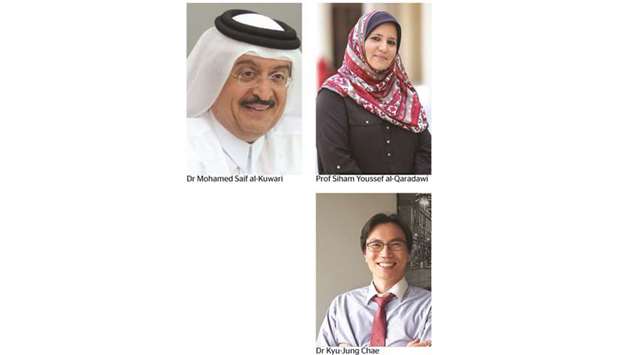Through co-operation between Qatar University (QU) and the Ministry of Municipality and Environment (MME), a joint research team has worked on a scientific project aiming to address the main challenges represented by lack of clean, renewable energy globally and the continuous production of wastewater that the world faces and hinders human development.
Scientific research societies have devoted tremendous efforts to developing alternative approaches to producing sustainable and clean energy sources such as biofuels.
Accordingly, there was an agreement between QU and the MME in 2018 with the aim of exchanging information and experiences to establish co-operation in various fields related to the scientific, administrative and technical fields, as well as in research and studies, and conducting scientific research on sustainable biofuel production using solar energy and organic materials.
The scientific team comprised Prof Siham Youssef al-Qaradawi, professor of organic chemistry at QU; Dr Mohamed Saif al-Kuwari, assistant undersecretary, director of the Studies Centre, MME; and Dr Kyu-Jung Chae, researcher and expert in studies related to the microbial electrolysis cell, Korea Maritime and Ocean University, South Korea. The project was carried out in co-operation with the Public Works Authority (Ashghal), supervised and funded by the Qatar National Research Fund (QNRF).
Prof Mariam al-Maadeed, vice-president for Research and Graduate Studies at QU, said: “We are keen to have the research and graduate studies sector at Qatar University co-operate with government institutions and research agencies to join efforts and exploit the available resources and expertise between the two parties.
From this standpoint, the agreement between the university and the ministry came to address the challenges on clean energy and the sustainability of its resources.
Biofuel production is a research achievement of this fruitful co-operation.”
Dr al-Kuwari stressed the importance of the research project, saying: “Scientific research on sustainable biofuel production using solar energy and organic materials in wastewater will open up new and broad horizons for the exploitation of the country’s natural resources for optimal use, in line with Qatar National Vision 2030.
Investment in this field will be enhanced through the generation of sustainable biofuels and their use in transportation and industry, as biofuels are a renewable energy source produced by converting organic materials. These can be used as fuel for various means of transportation and industrial facilities.”
He continued, “This scientific project provided an added value to convert wastewater into hydrogen, which is an effective and alternative approach to biofuel production in Qatar and all over the world, due to its high energy and environment-friendly combustion.
Biofuels can reduce greenhouse gas emissions by about 1.7bn tonnes per year, equivalent to more than 80% of current emissions from transportation and other things, thus leading to the introduction of a self-sustaining energy system for the production of bio-hydrogen with solar energy.
“Worldwide, large amounts of wastewater contain concentrations of inorganic, organic and microbiological pollutants; these are drained onto agricultural streams and inland lakes without reasonable treatment, thus having harmful effects on public health and the environment.
The use of wastewater as an energy source is a new and promising approach to meeting clean and sustainable energy requirements, and scientists have devised a microbial electrochemical cell as a promising multi-use approach and a relatively new method of generating hydrogen (biofuels) from organic materials found in wastewater.”
This research can be considered as a new platform for solar and biological energy fusion technology in Qatar, which includes innovative design and control of the chemical and physical properties of the compound electrode and membranes to provide outstanding performance towards green biofuel production and wastewater treatment, QU has stressed in a statement.
While expressing pride in the research co-operation that serves the general policy of the State based on achieving environmental sustainability, the research team has thanked QU, the MME, Ashghal and the Korea Maritime and Ocean University for encouraging and supporting, as well as QNRF for its interest in and sponsorship of the initiative.

..
